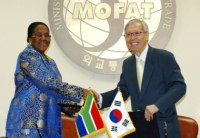South Africa's nuclear strategy in motion
08 October 2010
A new strategy for nuclear power is emerging in South Africa, including cooperation deals with China and South Korea.
 |
Dipuo Peters and Shin Kak-soo after
completing their bilateral this morning |
Having successfully operated two pressurized water reactors since the 1980s to supply 6% of the country's electricity, national utility Eskom announced a dramatic expansion program in January 2008. The company approached Areva and Westinghouse for bids on a bulk order of up to 12 reactors with the aim of establishing nuclear power at about 25% of supply and a budget of up to about $12 billion.
Sadly, this ambitious idea was to founder amid domestic political turmoil and the growing worldwide financial crisis. Eskom backed away in December 2008 "due to the magnitude of the investment."
Two years later and the country is renewing plans to expand nuclear generation. A strategic plan from minister of energy and minerals Dipuo Peters emphasised the need to "gravitate away" from fossil fuels, primarily coal from the north of the country.
"We are finalizing all the preparatory work in this regard," said Peters in the foreword to a plan that included a sub-program to improve the governance and regulation of the nuclear sector and a media engagement program to inculcate the challenges in the energy sector overall.
A public consultation on nuclear is forthcoming but Peters was confident enough to write, "There is no doubt that nuclear will play a key role in the base-load generating capacity in the next few years... This should then lead us to a projected presence of the next generation base-load nuclear power plants in the period beyond 2020."
Peters said, "Included in our plans is the conclusion of a number of bilateral agreements in the nuclear industry as well as establishing new strategic relationships."
One nuclear bilateral was completed today with South Korea. The nuclear cooperation agreement that is a prerequisite for trade was signed off in Seoul by Peters and acting minister of foreign affairs Sing Kak-soo. As well as nuclear trade in both directions, the deal should promote research and development, including personnel exchanges. A similar deal is expected soon with China.
Spokesmen from the ministry of energy were unavailable for comment on a "nuclear transaction" described in the plan. This is to be approved by parliament, but no dates were given for progress towards the goal.
Overall energy plans for South Africa include the continuation of the grid connection program to bring basic power services to 150,000 households each year to 2013 in addition to over 3.5 million homes electrified since 1994.
Researched and written
by World Nuclear News